- Home
- Neal Stephenson
Seveneves Page 5
Seveneves Read online
Page 5
So, both Bolor-Erdene and Maxim had ridden in the orbital module, which was unprecedented; humans were supposed to ride only in the reentry module aft of it.
It would have been indiscreet to point this out, but those two, by riding up front, had signed up for a one-way journey that could have turned into a suicide mission had anything gone wrong. The orbital module was jettisoned during the reentry process, and burned up in the atmosphere. Only the passengers in the reentry module could even theoretically make it back alive.
The vitamin bagging proceeded through the hatch into the reentry module and went viral as faces and arms were freed. In the three couches, where humans were supposed to ride, were the two other scheduled cosmonauts, Yuri and Vyacheslav, and the Brit, who was named Rhys.
Bolor-Erdene, Yuri, and Vyacheslav took their first chance to unstrap and move up through the orbital module into the Hub. Rhys requested that he be given a moment.
Dinah went into the Hub to greet the other four. In normal times these moments were at least a little bit ceremonious, with the new arrivals being greeted with hugs, or at least high fives, as they glided through the hatch, and photographs taken. The impending deaths of everyone on Earth cast a bit of a pall over this occasion, but Dinah felt she should at least say a few words to each of them.
Bolor-Erdene urged Dinah to address her as Bo. She was obviously of Far Eastern stock, and yet there was something in her eyes and cheekbones that did not look precisely Chinese. Dinah’s preliminary googling had already told her that Bo was Mongolian.
Yuri and Maxim were coming to ISS for their third and fourth times, respectively. Vyacheslav seemed to be a last-minute substitution for a younger cosmonaut who would have been making his first trip to the ISS. Vyacheslav had done two previous stints. So, all the Russians except for Bo were old hands at this, and once they had exchanged brief greetings with Dinah they glided through the middle of the Hub, looking about curiously since some of them hadn’t seen it before, and then through the hatch into the Zvezda module, which was like home to them. They exchanged clipped remarks in Russian of which Dinah understood about 50 percent. Everyone who worked on Izzy had to have at least working knowledge of Russian.
Rhys Aitken was an engineer who had made a career of building strange new constructs, usually for wealthy clients. Until seventeen days ago, his mission had been to lay groundwork for the addition of a second, larger torus, built around a newer Hub aft of the existing one and intended for space tourists. This was part of a public-private partnership between NASA and Rhys’s employer, a British billionaire who had been one of the early movers in the space tourism industry. Rhys had a new mission now, but he was still a perfect fit for the job.
Dinah went back through the orbital module and peered through the hatch at him, lying there patiently motionless in his couch.
“First time in space?” Dinah asked him, though she already knew the answer.
“Don’t you have Google up here?” he responded. From an American it would have been simply obnoxious, but Dinah had spent enough time around Brits to take it as intended.
“You just don’t seem very eager to explore your new home.”
“I’m stretching it out. The process of discovery. Besides, I was warned not to move my head.”
“To avoid nausea. Yeah, that’s good advice,” Dinah said. “But you have to move it eventually.” A loose packet of cucumber seeds, stenciled in Cyrillic, floated past her head. She plucked it carefully out of the air. Finding herself in range, she stuck out her hand. “Dinah,” she said.
“Rhys.” He extended his hand while gazing rigidly ahead, as he’d been instructed. But in the time-honored manner of most human males, he allowed his eyeballs to swivel her way so that he could check her out, then turned his head so that he could check her out better.
“You’re going to regret that,” she said.
“Oh, my goodness,” he exclaimed.
“You have a few minutes before it all comes up. Come on out, I’ll get you a bag.”
DURING ONE OF MANY RECENT SLEEPLESS “NIGHTS,” DINAH HAD found herself worrying about transistors. Modern semiconductor technology had found a way to make them very small. So small that they could be destroyed by a single hit from a cosmic ray. This didn’t much matter down on the ground, because the stakes were lower and cosmic rays were mostly blocked by the atmosphere. But electronics that had to work in space were a different matter. The world’s military-industrial complexes had put a lot of money and brainpower into making “rad-hard” electronics, more resistant to cosmic ray strikes. The resulting chips and circuit boards were, by and large, clunkier than the sleek consumer electronics that earthbound customers had come to expect. A lot more expensive too. So much so that Dinah had avoided using them at all in her robots. She used cheap, tiny off-the-shelf electronics in the expectation that a certain number of her robots would be found dead every week. A functional robot could carry a dead one back to the little airlock between Dinah’s workshop and the pitted surface of Amalthea, and Dinah could swap its fried circuit board out for a new one. Sometimes the new one would already be dead, struck by a cosmic ray while it was just sitting there in storage. But the vitamins shipped up on the ISS supply missions always had more of them.
The only shielding from cosmic rays was matter. A thick atmosphere such as Earth’s would do the trick, or a much thinner bulwark of solid heavy material. Of course, Dinah happened to have one in the form of Amalthea itself. Any object nestled up against Amalthea’s surface would be shielded from cosmic rays coming from roughly half of the universe—the half blocked from view by the asteroid. For the same reason, the ISS was always shielded by the Earth from any cosmic rays approaching from that direction. So there was a sweet spot, on the side of Dinah’s shop that faced toward Earth but was “under” the bulk of Amalthea, where cosmic rays could only squirt in from a relatively narrow band of space. Dinah stored her spare chips and circuit boards in that general area, just to improve their odds, and she limited the amount of time that her robots spent roaming about on the side of Amalthea that faced deep space.
In clear view of her window was a hollow in Amalthea’s side, perhaps an ancient impact crater, big enough to accommodate a watermelon.
On Day 9—five days before the conference in the Banana when Doc Dubois had told them about the Hard Rain and the president had told them that they were never coming home—she had programmed several of her robots—the ones with the most effective cutting heads—to begin making that hollow deeper. Perhaps she’d had a premonition of what was about to happen. Or perhaps she was just doing her job; mining robots would need to have the ability to carry out programmed activities such as boring tunnels into rock, and it was high time she began experimenting with such tasks.
But after that conference in the Banana, she had gone back to her little shop and, as an alternative to crying all night or sticking her head out the airlock, she had altered the program that those little robots were following and told them to begin bending the tunnel, curving it gently as it delved into the asteroid. Until then, the robots had been moving directly away from her and she’d been able to look through her tiny quartz window, into the watermelon-sized hollow, and straight down the tunnel that the robots were cutting. She had to flip a welding glass down over the window when she did this because they were cutting with plasma arcs whose brilliant purple light would burn her eyes. But by the time that the five new arrivals got to Izzy on A+0.17, the robots had disappeared around the bend in the tunnel that they had made. The universe could not see them. Cosmic rays ran in straight lines, like light, and they could not negotiate that bend.
Dinah had them carve a little hollow into the side of that tunnel: a storage niche. She packaged up all of her spare chips and PC boards into a bundle. It was a small one, given how tiny and powerful modern chips were—a cube small enough to hold in one hand. Normally this would have been a bad idea—a single cosmic ray might shoot through the entire stack and kill ever
y board at once. She handed it off to an eight-legged robot and sent that robot through the airlock and down the tunnel. Seeing through the remote eye of its video camera, manipulating a data glove connected to its grappling arms, she maneuvered it into the niche and then made it splay out its arms and go rigid so that it couldn’t drift out. Her transistors were now safe.
Rhys watched her do it. He had been on Izzy for five hours. He was too sick to do anything except lie very still. Dinah, whose shop was full of zip ties and clamps and other useful devices, had helped him wedge his head between a couple of pipes, padding them with foam to make it a little more comfortable. She had left him with a supply of barf bags and gone about her work.
“What do you call that type?” he asked.
“A Grabb,” she answered. “Short for Grabby Crab.”
“Good name, I suppose.”
“It’s the most obvious body type for something that’s meant to pick its way around on a rock. Each leg has an electromagnet on its tip, so it can stick to Amalthea, which is mostly iron. When it wants to pick up that foot, it just switches off the magnet.”
“I’m sure you’ve already thought of this,” Rhys said delicately, “but you could hollow out the whole asteroid this way. Create a shielded environment. Maybe even fill it with air.”
Dinah nodded. She was busy, placing the Grabb’s eight arms one by one, making sure each of them was stuck to a wall of the niche. It would be embarrassing if all of her vitamins floated out and got lost. “We’ve discussed it. Me and the, like, eight thousand engineers on the ground who are working on this.”
“Yes, I didn’t suppose it was a solo effort.”
“The constraint is working gas. The plasma cutters are very powerful, but they require some gas flow. Almost any gas will do. But industrial gases are rare and valuable up here, and they have this annoying habit of escaping into space.”
“But if you were hollowing something out, as opposed to working on its surface—”
“Exactly,” Dinah said. “You could seal the exits and recapture the used gas, and recycle it.”
“So you’re way ahead of me, in other words.”
Dinah’s upper face was obscured in a VR rig but a smile spread below it. “That’s the thing about space,” she said. “So many smart people are so interested in it that it’s difficult to come up with a really new idea.”
There was a pause in the conversation while she switched control to a different robot and got it moving down the tunnel.
“Moving my eyeballs oh so slightly, I see at least three other morphologies in your bestiary.”
“The Siwi is adapted from a robot that was made for exploring collapsed buildings. Which in turn was obviously adapted from a snake.”
“A sidewinder, presumably, given the name.”
“Yeah. The electromagnets are arranged around the Siwi’s body in a double helix, so by turning some on and others off, it can sort of roll diagonally along the surface with minimal power usage.”
“The thing that looks like a Buckyball seems to be using a similar trick.”
“You nailed the name. We do in fact call those Buckies. Technically speaking, it’s a thing called a—”
“Tensegrity.”
Dinah felt herself blushing. “Of course, you’d know all about those. Anyway, because it’s big and roughly spherical, it can roll in any direction by playing tricks with electromagnetics and making its struts get longer or shorter. The brains live in that sort of nucleuslike package suspended in the middle.”
“Grabbs, Siwis, and Buckies. What do you call the tiny ones?”
“Nats. Our attempt to build a swarm. Lina’s been moonlighting on it.”
There was a little gap in the conversation while both of them considered the unfortunate choice of wording.
“It’s pretty experimental still,” Dinah continued. “But the idea is that they can latch on to each other as needed, like ants making an ant-ball to cross a river. I know this must all seem pretty weird. It’s not normal engineering.”
“I’m not a normal engineer. I’ve been doing biomimetics—which is what you are doing—for a while. Except I build things that stand still.”
“Okay. You get it then.” Dinah peeled off the 3-D goggles she’d been using to see through the eyes of the Grabb. The second robot, the Siwi, had perched itself in the tunnel behind the Grabb and raised its head, cobralike, to shine light on it and shoot video. Gazing at the flat-panel screen, Dinah made the Siwi pan back and forth to inspect the Grabb’s position, ensuring there was no way those circuit boards could drift away.
“Yes. I get it,” Rhys said. Then he added, “It’s not for me to tell you your business. But you know what hermit crabs do, don’t you?”
It took Dinah a few moments to access the memory. She had never been a beach kind of person. “They use the discarded shells of other crabs as shelter.”
“Not of other crabs, but of mollusks. But yes, you have it.”
Dinah thought about it for a moment, then turned to look at him. He seemed slightly less green and sweaty than before. “I think I see where you are going.”
“Better yet,” Rhys said, “consider the foraminifera.”
“What are they?”
“The biggest single-celled organisms in the world. They live beneath the Antarctic ice. And as they grow, they take grains of sand from their environment and glue them together to form hard outer skins.”
“Sort of like Ben Grimm?” she asked.
It was a throwaway reference to a comic book character, the armor-plated member of the Fantastic Four. She didn’t expect him to pick up on it. But he shot back: “To name another cosmic ray victim, yes. But without the alienation and self-pity.”
“I always wanted skin like the Thing.”
“It wouldn’t suit you nearly as well as the skin God gave you. But as a way for you to protect your robots from cosmic rays, while giving them the freedom to roam around—”
“I think I’m in love,” she said.
He clapped a bag over his mouth and threw up.
HOW DO YOU TELL THE WORLD THAT IT’S GOING TO DIE? DOOB WAS glad he didn’t have to say it. Instead he just stood behind the president of the United States. His job was to look serious—which wasn’t difficult—as part of a Mount Rushmore of eminent scientists lined up behind a semicircle of world leaders. He stared at the back of J.B.F.’s head as she explained it into a teleprompter. Bracketing her were the Chinese and the Indian presidents, saying the same things at the same time in Mandarin and Hindi. Fanning out into the wings were the prime ministers of Japan, the United Kingdom, France, and (acting as a sort of proxy for most of Latin America, as well as his own country) Spain; the chancellor of Germany; the presidents of Nigeria, Russia, and Egypt; the pope; prominent imams from the main branches of the Islamic faith; a rabbi; and a lama. The announcements were made simultaneously, so that as much of the human race as possible would hear the news at the same instant, and not have to await translations.
If the task had fallen to Dubois Jerome Xavier Harris, Ph.D., he would have said something like this: Look, everybody dies. Of the seven billion people now living on Earth, basically all will be dead a hundred years from now—most a lot sooner. No one wants to die, but most calmly accept that it’s going to happen.
A person who died two years from now in the Hard Rain would be no deader than someone who died seventeen years from now in a car crash.
The only thing that had changed now was that everyone knew the approximate time and manner of their death.
And knowing that, they could make preparations. Some of those were internal: making your peace with your God. Others had to do with passing on one’s legacy to the next generation.
And that was where things got interesting, because none of the traditional legacy-passing schemes was going to survive the Hard Rain. There was no point in drawing up a last will and testament, because all of your possessions were going to be destroyed along with you, and the
re would be no survivors to receive them.
The legacy was instead going to consist of whatever the people of the Cloud Ark did in the centuries and millennia to come. The Cloud Ark was the only thing that mattered.
They did it at Crater Lake, Oregon. The State Department had commandeered the rustic lodge perched high above the lake on the crater’s rim, flown in the dignitaries, crammed the nearby campgrounds and parking lots with security and media and logistics. At this very moment, marines out on the highway were turning back disappointed holidaymakers, telling them the park was closed, letting them know that they should turn on their radios and listen to the news if they really wanted to understand why. To put the disruption of their vacations into perspective.
The weather was clear, which meant it was cold. The lake down in the crater was the purest blue Doob had ever seen, the sky above it a lighter tint of the same color. He and all the others stood with their backs to it during the announcement. Some political genius on the president’s staff had figured out just how the imagery was supposed to work. The cameras were up on a scaffolding so that they could shoot downward, ensuring that the panorama of the crater, Wizard Island with its sparse covering of trees, and the snow-streaked mountain rim were all there in the high-definition backdrop of the shot. The message was there for anyone who wanted to read it. Between six and eight thousand years ago, an unimaginable catastrophe had befallen this place. The surviving humans had kept the story alive in legends of an apocalyptic struggle between the gods of the sky and of the underworld. Now, it was beautiful. The president and some of the other leaders were weaving that story into their announcements. Doob and the scientists around him—professors from great universities all over the world—couldn’t hear what was being said. The leaders were projecting their words outward into the world, and the sounds coming out of their mouths were swallowed up in the rushing of the wind over rocks and through trees. Doob, four meters behind the president, watched the wind mess with her hair. J.B.F.’s hair had been much commented on during the days before Zero, when such things had actually seemed important to commentators in the world of fashion and politics. It was dusky blond, streaked with silver. She wore it straight and shoulder-length. She was forty-two years old, which made her the youngest president of the United States, edging out J.F.K. by a year. She had flirted with politics during her student years at Berkeley but then opted for an M.B.A. and a stint with a high-powered business consultancy before taking a job at a clever but struggling Los Angeles tech firm. Under her leadership the company had turned its fortunes around to the point where it had been acquired by Google in a deal that had made her wealthy. She had married an actor turned producer, ten years older, whom she had met at a dinner party in Malibu. He already had dogs in various political fights, since a number of his films had been overtly political documentaries or thrillers with political overtones. Latino, with some family history of persecution under Castro, Roberto was something of a political chameleon, mixing libertarianism and populism in a way that intrigued both sides without repelling anyone save the most hard-core extremists. He got away with it because he was handsome, charming, and, as he freely admitted, not book-smart enough to puzzle out all the issues.

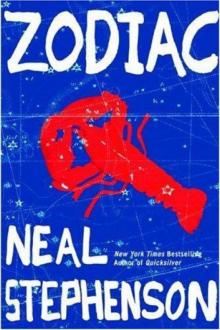 Zodiac: The Eco-Thriller
Zodiac: The Eco-Thriller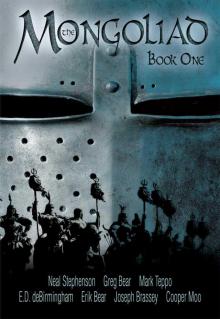 The Mongoliad: Book One
The Mongoliad: Book One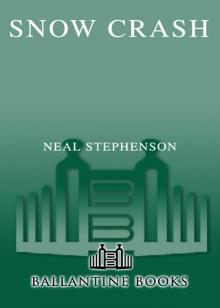 Snow Crash
Snow Crash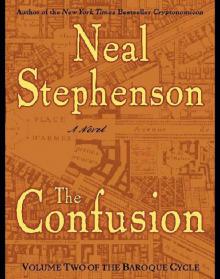 The Confusion: Volume Two of the Baroque Cycle
The Confusion: Volume Two of the Baroque Cycle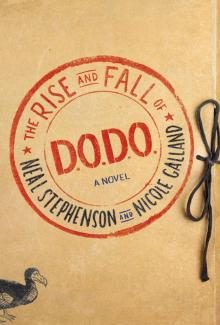 The Rise and Fall of D.O.D.O.
The Rise and Fall of D.O.D.O.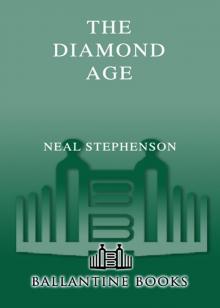 The Diamond Age: Or, a Young Lady's Illustrated Primer
The Diamond Age: Or, a Young Lady's Illustrated Primer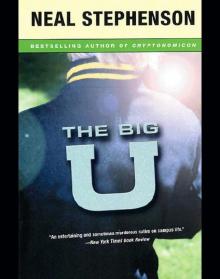 The Big U
The Big U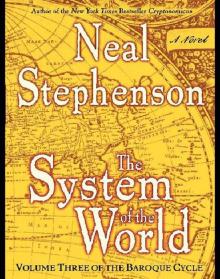 The System of the World: Volume Three of the Baroque Cycle
The System of the World: Volume Three of the Baroque Cycle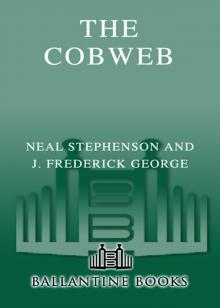 The Cobweb
The Cobweb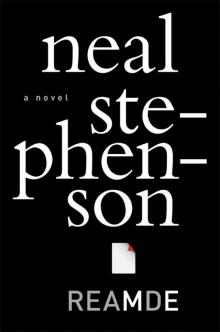 Reamde
Reamde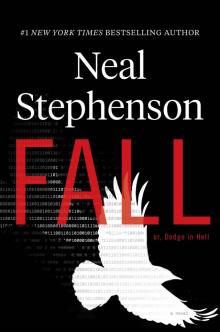 Fall; or, Dodge in Hell
Fall; or, Dodge in Hell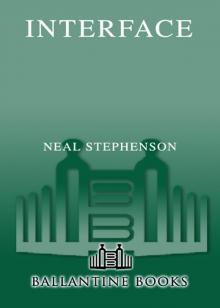 Interface
Interface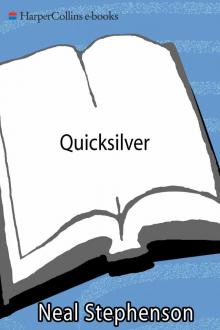 Quicksilver
Quicksilver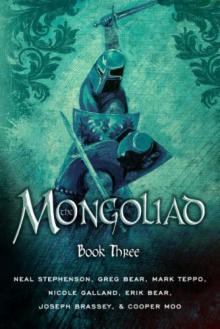 The Mongoliad: Book Three
The Mongoliad: Book Three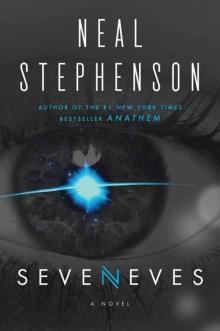 Seveneves
Seveneves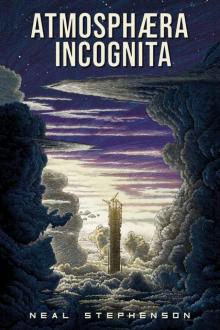 Atmosphæra Incognita
Atmosphæra Incognita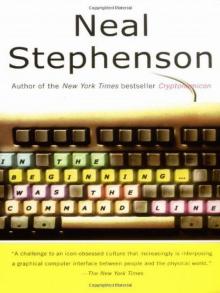 In the Beginning...Was the Command Line
In the Beginning...Was the Command Line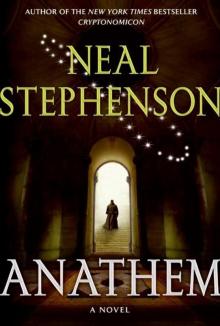 Anathem
Anathem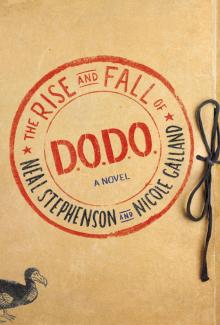 The Rise and Fall of D.O.D.O.: A Novel
The Rise and Fall of D.O.D.O.: A Novel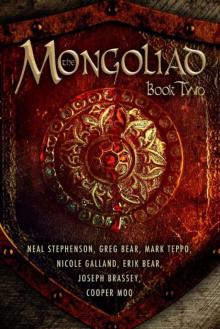 The Mongoliad: Book Two
The Mongoliad: Book Two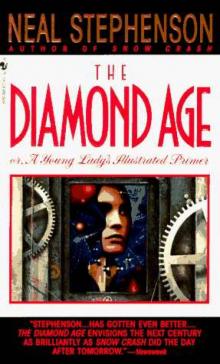 Diamond Age or a Young Lady's Illustrated Primer
Diamond Age or a Young Lady's Illustrated Primer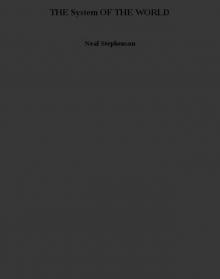 THE System OF THE WORLD
THE System OF THE WORLD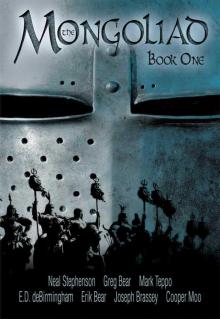 The Mongoliad: Book One tfs-1
The Mongoliad: Book One tfs-1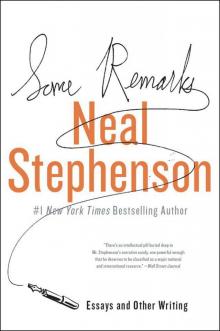 Some Remarks: Essays and Other Writing
Some Remarks: Essays and Other Writing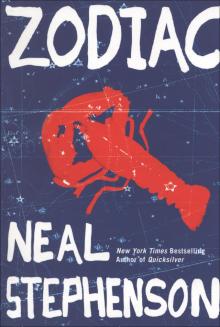 Zodiac
Zodiac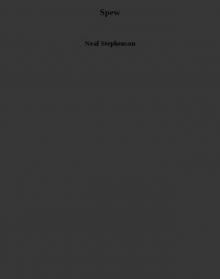 Spew
Spew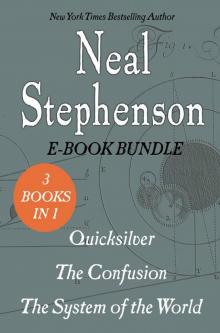 The Baroque Cycle: Quicksilver, the Confusion, and the System of the World
The Baroque Cycle: Quicksilver, the Confusion, and the System of the World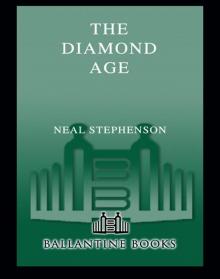 The Diamond Age
The Diamond Age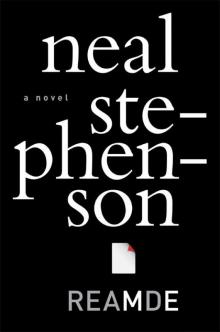 Reamde: A Novel
Reamde: A Novel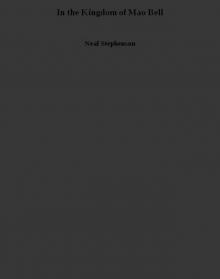 In the Kingdom of Mao Bell
In the Kingdom of Mao Bell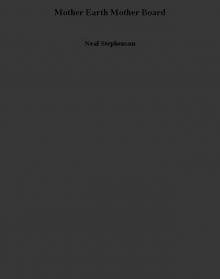 Mother Earth Mother Board
Mother Earth Mother Board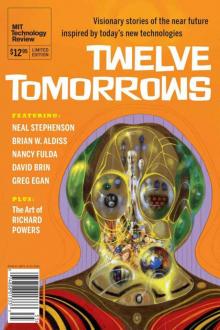 Twelve Tomorrows - Visionary stories of the near future inspired by today's technologies
Twelve Tomorrows - Visionary stories of the near future inspired by today's technologies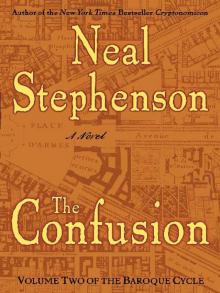 The Confusion
The Confusion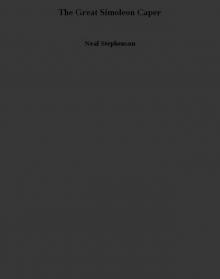 The Great Simoleon Caper
The Great Simoleon Caper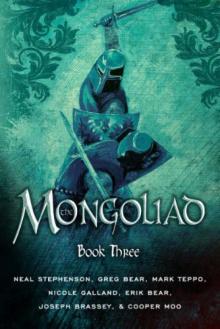 The Mongoliad: Book Three tfs-3
The Mongoliad: Book Three tfs-3